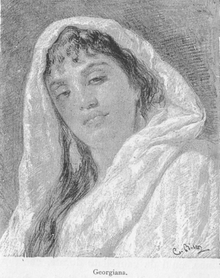- Chveneburi
-
Chveneburi
ჩვენებური
Total population 100,000[1][2] (est.) 1,000,000 [3]
Regions with significant populations Turkey Languages Religion Related ethnic groups Chveneburi (Georgian: ჩვენებური, čveneburi), meaning "of us" in Georgian, is an autonym of Muslim immigrants of Georgian descent who had settled in non-Georgian majority regions of Turkey, thus, "of us" signifies a triple distinction from Christian Georgians, Muslim Turks, and autochthonous Muslim Georgians. Chveneburi are Sunni Muslims of Hanafi madh'hab.
Contents
History
Chveneburi had arrived in Turkey basically in three waves of migration due to ethnic cleansing and pograms of Muslims by the Russian Empire. The first wave was during and after the Russo-Turkish War, 1828-1829 when the Sublime Porte consigned its sovereignty over several parts of Georgia to the Russian Empire. Minor immigrations had also followed until Russo-Turkish War, 1877–1878 when the major wave of immigration involved immigrants from historic Georgian regions that had considerable Muslim populations like Artvin, Adjara, Ardahan, Samtskhe, and Lower Guria. Adjarians were also known by their places of origin, such as Batumlular for people from Batumi, Çürüksulular for people from Kobuleti. This wave of being muhajirs, known as muhajiroba (მუჰაჯირობა) had left many Muslim-majority regions of Georgia virtually depopulated. The last sizeable wave of immigration was in 1921 when Turkey finally gave up her claims on Adjara in the Treaty of Kars with the Soviet republics. This last wave also involved Turkish-speaking Muslims from Upper Adjara.
Distribution
Chveneburi live scattered throughout Turkey, although they are concentrated on two major regions of residence:
- Black Sea coast, in the provinces Giresun, Ordu, Samsun, and Sinop, with extension to Amasya and Tokat. Chveneburi particularly in the Ünye, Ordu, Terme, and Çarşamba areas preserve their speech and traditions.
The statistical information regarding the Georgians of Turkey is scarce and not accurate. According to the Turkish census of 1965, 34,330 persons declared speaking Georgian as mother-tongue and 48,976 as second language. Magnarella estimated the number of Georgians in Turkey to have been over 60,000 in 1979.[4]
Press
The most important Georgian cultural magazine in Turkey also bears the name Çveneburi. It was founded in 1977 in Stockholm Sweden by Shalva Tevzadze. Distributed in Turkey by Ahmet Özkan Melashvili who also wrote the book Gürcüstan (Georgia) in 1968. In 1980, Özkan was assassinated in Bursa by the Grey Wolves [1]. Since then, Osman Nuri Imedashvili has been in charge of the magazine. The magazine's content is almost completely in Turkish and presents articles on Chveneburi as well as the present situation and the history of Georgia and Georgians worldwide. Another journal Pirosmani, bilingual in Georgian and Turkish, is published in Istanbul.
Group identity
Group identity is shaped basically by the schism with Christian Georgians. Chveneburi usually restrain from using the word Kartveli (ქართველი) as a self-designation because they think it indicates being a Christian.[2] They prefer to use Gurji (Gürcü) (გურჯი) when referring to their more precise ethnic background. Islam still plays a central role in the lives of most Chveneburi. They had long harbored suspicion for the Georgian SSR's atheistic policies and, today, allegations of mass conversions to Christianity in Georgia bear a potential to further sever the ties.[citation needed]
Intermarriage with other Sunni groups is common. In some regions, specifically Ünye for instance, Chveneburi maidens are sought brides, seen by local Turkish population as beautiful and hard-working wives. This phenomenon further accelerates cultural and linguistic assimilation of the community.
Historical theses to lay claims for a non-Georgian or Turkic ancestry for Chveneburi have been encouraged by the Turkish State. The most prominent figure of this historiography was Mehmet Fahrettin Kırzıoğlu. A more recent example of such efforts is the 2001 book by Yunus Zeyrek, Acarlar ve Acaristan. Many Chveneburi have assigned to these ideas and style themselves as Ajar from the historical Georgian land Ajaristan.
See also
- Adjarians
- Pontic Greeks
- Hamshenis
- Laz people
- Peoples of the Caucasus in Turkey
- Iranian Georgians
- Pirosmani
- Islam in Georgia
References
- Black Sea: Encyclopedic Dictionary (Özhan Öztürk. Karadeniz: Ansiklopedik Sözlük. 2. Cilt. Heyamola Publishing. Istanbul. 2005. ISBN 975-6121-00-9.)
- Paul J. Magnarella, The Peasant Venture: Tradition, Migration and Change among Georgian Peasants in Turkey. (Schenkman Publishing Company: Cambridge, MA, 1979) ISBN ISBN 0-8161-8271-X
- Mikaberidze, Alexander (ed., 2007). Özkan, Ahmet. Dictionary of Georgian National Biography.
- ^ http://books.google.com.tr/books?id=hvmy_skUPNYC&pg=PA420&dq=number+georgians+living+in+turkey&hl=tr&ei=dMk1TMumFY-gkQXxw_W_Aw&sa=X&oi=book_result&ct=result&resnum=3&ved=0CDAQ6AEwAjgK#v=onepage&q&f=false
- ^ http://books.google.com.tr/books?id=uwi-rv3VV6cC&pg=PA291&dq=number+georgians+living+in+turkey&hl=tr&ei=Wck1TOO7F82GkAWarbWrAw&sa=X&oi=book_result&ct=result&resnum=2&ved=0CC8Q6AEwAQ#v=onepage&q=number%20georgians%20living%20in%20turkey&f=false
- ^ "Türkiyedeki Kürtlerin Sayısı!" (in Turkish). Milliyet. 2008-06-06. http://www.milliyet.com.tr/default.aspx?aType=SonDakika&Kategori=yasam&ArticleID=873452&Date=07.06.2008. Retrieved 2008-06-07.
- ^ Peter A. Andrews & Rüdiger Benninghaus (1989), Ethnic Groups in the Republic of Turkey, Vol. 1, p. 174. Reichert, ISBN 3882264187.
External links
- Chveneburi
- Pirosmani / ფიროსმანი
- Gezgin, Ulas Basar (2004) Republican and Post-Republican Responses to New Georgian Nationalisms (PhD Proposal in Anthropology). teori.org (includes a list of selected publications on the Georgian communities of Turkey)
Categories:- Ethnographic groups of Georgian people
- Ethnic groups in Turkey
- Caucasian muhajirs
- Georgians in Turkey
- Muslim communities
Wikimedia Foundation. 2010.
